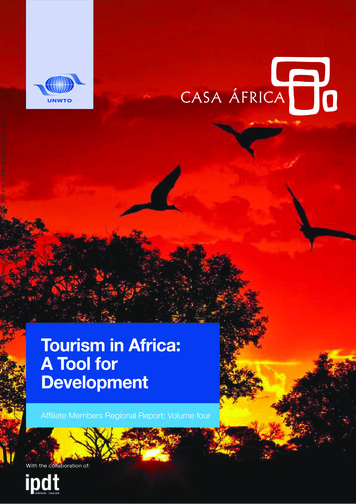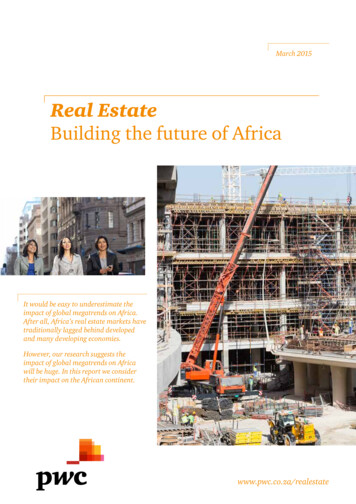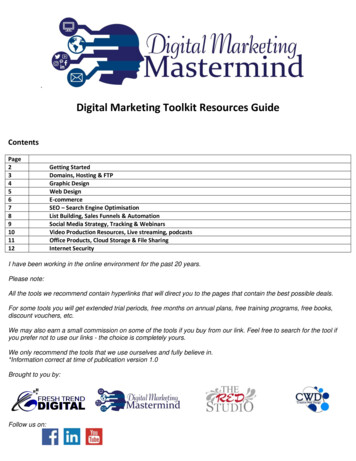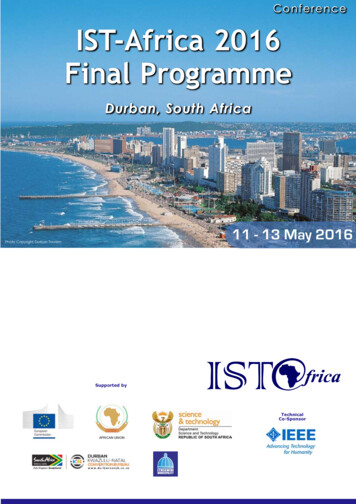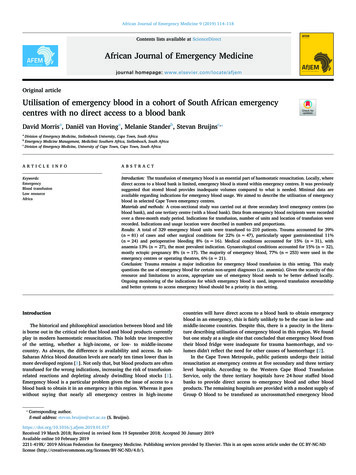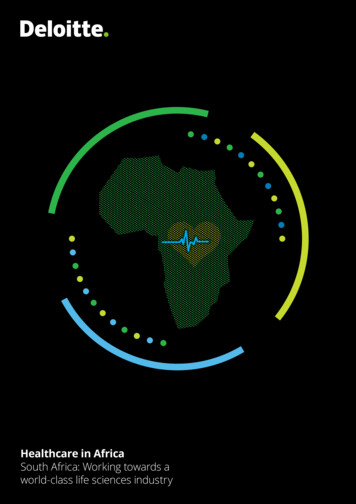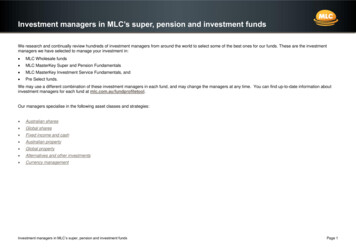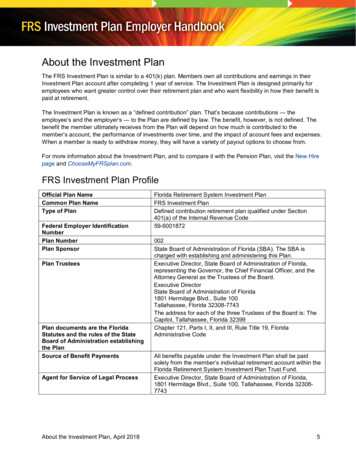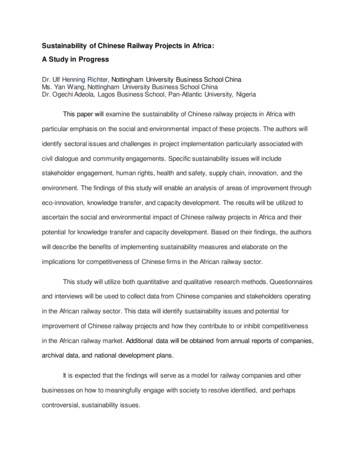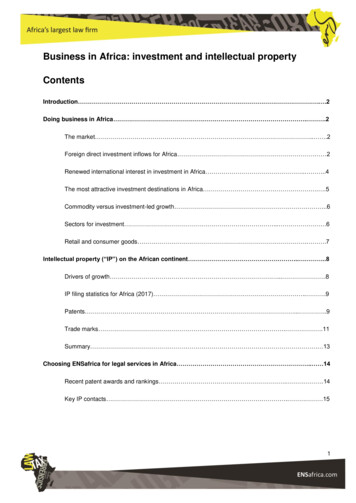
Transcription
Business in Africa: investment and intellectual propertyContentsIntroduction . .2Doing business in Africa . .2The market . .2Foreign direct investment inflows for Africa 2Renewed international interest in investment in Africa . .4The most attractive investment destinations in Africa . .5Commodity versus investment-led growth .6Sectors for investment . 6Retail and consumer goods . .7Intellectual property (“IP”) on the African continent . .8Drivers of growth . .8IP filing statistics for Africa (2017) . .9Patents . .9Trade marks . .11Summary 13Choosing ENSafrica for legal services in Africa . 14Recent patent awards and rankings . .14Key IP contacts . 151
IntroductionExponential economic development across Africa has resulted in a greater necessity for increasedprotection of intellectual property (“IP”) assets on the continent. Below, we consider the potential forinvestment in Africa, as well as the opportunities for IP activity on the continent.Doing business in AfricaThe marketAfrica’s growth momentum is expected to slow from 3.9% in 2018 to 4.1% in 2019. However, many Africancountries are forecast to grow above this average between 2018 and 2023, with 11 growing above 6%.Ethiopia is forecast to be the fastest-growing economy in Africa, averaging 8.2% for the next six years.Egypt, Nigeria and South Africa were the three largest markets in Africa in 2018, making up almost half ofAfrica’s almost USD7-trillion market size1.There are unique opportunities among the challenges in Africa, which contains about 10 of the 20 fastestgrowing economies in the world. The high rate of population growth and increase in spending power over thenext 15 to 20 years makes Africa the continent from which global markets, customers and employees of thefuture are emerging.Foreign direct investment inflows for AfricaForeign direct investment (“FDI”) flows into Africa have weakened in 2017 to USD42-billion, a 21% declinefrom the previous year. This fall was partially due to a 22% decrease in the value of cross-border M&A 2.Although it seems that Africa’s rapid economic expansion that was predicted three to five years ago has notfully materialised due to various factors (including the contracted global economy, weak oil prices andsevere droughts in many African countries), Africa is still primed for growth but at a slower rate of expansionthan previously predicted, as countries around the world reconsider their long-term development strategiesin light of the present global economic climate. Investment opportunities in Africa are plentiful but should beapproached with careful planning and require resilience and determination on the part of the investor 3.Rand Merchant Bank’s Where to invest in Africa — A Guide to Corporate Investment 2019 editionUNCTAD, World Investment Report: investment and new industrial policies 20183Rand Merchant Bank’s Where to invest in Africa — A Guide to Corporate Investment 2016 2017 edition122
A survey carried out in June 20164 provides evidence of investor confidence in the continent with 75% ofrespondents saying that they were already invested in Africa and plan to invest even further, and anadditional 6% saying that while they weren’t invested in Africa yet, they planned to in future.The bulk of FDI into Africa comes from multinational enterprises in developed economies and developingeconomy investors from China, Singapore, India and Hong Kong. There is also significant inter-Africaninvestment, mostly from South African investors into other African countries.Total FDI inflows to Africa decreased in 2016 compared to 2015, from USD61.5-million to USD59.4-million,whereas FDI outflows from Africa increased marginally in 2016 compared to 2015, from USD18-million toabout USD18.2-million5. However, Chinese FDI to Africa has grown by 40% annually over the past ten yearswith Angola, Côte d’Ivoire, Ethiopia, Kenya, Nigeria, South Africa, Tanzania and Zambia making up around50% of Chinese investment6.Source: UNCTAD, World Investment Report: investment and new industrial policies 2018.Rand Merchant Bank’s Where to invest in Africa — A Guide to Corporate Investment 2016 2017 editionUNCTAD, World Investment Report: investment and new industrial policies 2018.6UNCTAD, World Investment Report: investment and new industrial policies 2018.453
Source: UNCTAD, World Investment Report: investment and new industrial policies 2018.Renewed international interest in investment in AfricaThere is clearly a renewed interest in Africa with a number of heads of state visits to Africa in 2018, includingby the UK’s Theresa May, Germany’s Angela Merkel, and China’s Xi Jinping. The 2018 Forum on ChinaAfrica Cooperation (FOCAC) held in September 2018 in Beijing was attended by almost all African nationsand President Xi Jinping pledged to invest USD60-billion in the African continent.It will also be interesting to see what the impact of the G20 Marshall Plan for Africa that is being driven underGermany’s chairmanship will have on African investment and economic growth. Some of the plannedinterventions include: support for small and medium-sized enterprises that provide around 80% of employment in Africa bydevelopment of financial services that are better tailored to their needs, including loans, localcurrency loans and risk management by the German Federal Ministry for Economic Cooperation andDevelopment (“BMZ”), the African Development Bank, local banks, KfW Entwicklungsbank and theWorld Bank; promotion of agricultural and food industries in African countries through 14 green innovationcentres, where experts from private industry and academic institutions work with African farmers to4
improve procedures for cultivation, reduce harvest losses, improve marketing, promote selforganisation among farmers, enhance quality standards and enhance trade; an initiative by BMZ to support the development of quality assurance infrastructure in African partnercountries to ensure that African goods meet the standards of their target markets, includingenvironmental, health, and labour protection standards, as well as to strengthen customs systems toprovide greater security for companies involved in cross-border trade. Under the Economic Partnership Agreement, products from Botswana, Lesotho, Mozambique,Namibia and eSwatini (formerly Swaziland) will permanently be guaranteed tariff- and quota-freeaccess to European markets and European market access to South Africa will also be significantlyincreased. In return, these African countries will open their markets over time to around 80% of theEU's products; and the development of digital technologies that can and have already been seen to provide significantadvantages and opportunities in Africa will also be facilitated in African partner countries. Forexample, digital systems for recording data and managing farming and small businesses canprovide more efficient business management as well as provide proof of income, giving smallbusiness owners, farmers and fishers access to loans and investments.The most attractive investment destinations in AfricaRMB’s Investment Attractiveness Index7 is a useful measure of the most appealing African territories forinvestment. The methodology combines macroeconomic fundamentals with the practicalities of doingbusiness in Africa and includes elements that are considered by RMB to be most important for investment:economic activity (expressed as a weighted average of market size and forecasted levels of GDP growth)and the operating environment.The top five most appealing African territories for investment in 2018 are, in order, Egypt, South Africa,Morocco, Ethiopia and Kenya. Egypt tops the rankings largely because of its economic activity score.However, it is interesting to note from RMB’s in-house survey8 that the operating environment for a countryis often a greater determinant for determining investment in that country by a firm than the credit rating of acountry. In order the factors considered, from most to least important were:78Rand Merchant Bank’s Where to invest in Africa — A Guide to Corporate Investment 2019 editionRand Merchant Bank’s Where to invest in Africa — A Guide to Corporate Investment 2016 2017 edition5
macroeconomic and political stability economic growth ease of doing business size of the economy (in USD terms) sovereign credit ratingWhen weighting for operating environment, Mauritius is Africa’s most attractive business environment,followed by Rwanda, Botswana, and South Africa. Mauritius has a well-developed infrastructure, a healthyand educated workforce, the most efficient goods market and strong institutions. However, South Africa stillleads the continent in the vital areas of financial markets, transport infrastructure and strong institutions.Commodity versus investment-led growthThere is a clear dichotomy between growth through commodities versus investment-led growth. Ascommodity prices fell, there was a significant pressure exerted on the economic growth of countries in whichgrowth is predominantly commodity-led, such as Zambia, Nigeria and Angola. However, more diversifiedeconomies like Kenya, Côte d’Ivoire and Senegal have continued to grow at a steady pace. It is expectedthat as the resource prices recover, the commodity-led economies will rebound and lift economic output.Countries such as Nigeria, Angola and Gabon that are oil-producing nations, will recover as oil pricesrecover9.Sectors for investmentCollectively, technology, media and telecommunications, consumer products and retail and financialservices make up around 45% of total FDI projects10. However, it appears that investors are looking to the“next wave” of sectors beyond consumer-facing ones and this has stimulated FDI into sectors such astransport and logistics, real-estate, hospitality and construction and the automotive sectors11.Sub-Saharan Africa remains at the forefront of the mobile money revolution (ie, monetary transactionsthrough use of mobile phones).Looking at the key trends shaping Africa, the predominant role of digital technology, particularly in thefinancial sector, is highlighted12.Rand Merchant Bank’s Where to invest in Africa — A Guide to Corporate Investment 2018 editionFDi Markets: FDI Report 201711Ernest and Young 2017 Attractiveness Program Africa12Rand Merchant Bank’s Where to invest in Africa — A Guide to Corporate Investment 2016 2017 edition9106
The reason for the phenomenal growth in the mobile money sector is simple: more than 50% of Africansover the age of 15 have mobile phones with internet connectivity and these offer a cost-effective, userfriendly and secure method of transacting in a rapidly growing population. In addition, the mobile moneysector is expected to grow: it is predicted that the number of mobile phone subscribers will soar to 400million, and if even only 1/3 of these adults have traditional bank accounts, then mobile financial servicescould be extended to more than 250-million people over the next three years.Retail and consumer goodsIn the retail sector, there are effectively three stages in the retail value proposition in Africa:1. basic (such as Gambia, Zambia, Ethiopia, Tanzania and Angola) where there is no formal shoppingculture and price is the key driver of purchases;2. developing (such as Nigeria, Ghana and Mozambique) where there is an emerging shoppingculture and a widening of assortments of dry and fresh basic goods and speciality goods and whereprice, service and quality are important to the buyer; and3. mature (such as South Africa, Botswana and Namibia), where there is a formal shopping culturewith international exposure and private label exposure, significant innovation, stable and transparentpricing and where convenience and quality are the key drivers for purchases 13.It is recommended that in the retail sector, it is most useful for an international investor to establish a jointventure with a local partner, thereby benefitting from local firms’ expertise and knowledge of localconsumers, and understanding and developing an appropriate pricing strategy for local consumers. Inaddition, local partners can provide invaluable local connections for distribution and can provide an edgeover other local competitors in the market14.1314AT Kearney: The 2015 African Retail Development IndexRand Merchant Bank’s Where to invest in Africa — A Guide to Corporate Investment 2016 2017 edition7
IP on the African continentDrivers of growthThe main drivers of growth in IP activity in Africa include: substantial investment in health care across the continent discovery of oil and gas reserves along the African east and west coasts has created an investmentboom in “mega projects” the fastest growing middle class in the world:oAfrica’s middle class has tripled over the last 30 yearso7 of the 10 fastest growing middle classes in the world are from African countriesothe current trajectory suggests that the African middle class will grow to 1.1-billion (42%) by2060 technology and rising productivity provide opportunities for “leapfrogging” of old technologies andmany African countries are becoming early adopters of new technologies, avoiding investment inolder technologies substantial investment in clean technology infrastructure projects, with solar power projects leadingthe way in Egypt, Kenya and South Africa8
IP filing statistics for Africa (2017)PatentsIn 2017, 0.5% of all patent filings globally were in Africa.Source: WIPO Statistics Database, September 2018.9
a. Only offices with at least one application filed are presented.b. Application class count is the sum of classes specified in applications received directly by an office plus, where applicable, thosespecified in designations received by the office via the Madrid System.c. Application design count is the sum of designs contained in applications received directly by an office plus, where applicable, thosecontained in designations received by the office via the Hague System. indicates either zero, not available or not applicable.Source: WIPO IP Facts And Figures, 2018.Interestingly, 2017 saw a further increase in the number of African patent applications filed compared toprevious years. Patent filings at the South African patent office increased by 29.5% in 2016 compared to10
2015, to just over 9 300 patent filings 15, but have decreased slightly in 2017 to 8 72016. In addition, thenumber of patent applications filed at the African Regional Intellectual Property Organization (ARIPO) grewby 7.2% compared with 2016 while the African Intellectual Property Organization (OAPI) patent filingsincreased by 2.6%17. This trend will be interesting to follow.Total patent 00001997 1998 1999 2000 2001 2002 2003 2004 2005 2006 2007 2008 2009 2010 2011 2012 2013 2014 2015 2016 2017AfricaSource: WIPO (2018). World Intellectual Property Indicators 2018. Geneva: World Intellectual Property OrganizationTrade marksIn 2017, 1.9% of all trade mark class applications globally were filed in Africa 18.15WIPO (2017). World Intellectual Property Indicators 2017. Geneva: World Intellectual Property OrganizationCompanies and Intellectual Property Commission, 2017/2018 Annual Report17WIPO IP Facts And Figures, 2018; WIPO Statistics Database, September 201818WIPO IP Facts And Figures, 2018; WIPO Statistics Database, September 20181611
Source: WIPO (2017). World Intellectual Property Indicators 2017. Geneva: World Intellectual Property Organization.The total number of trade mark applications filed in Africa in 2017 declined compared to 2016, prior to whichthe filing numbers had been fairly static19. As in the case of patent filings, the majority of the trade markapplication filings in 2017/2018 occurred in South Africa, with a total of 37 748 applications filed, a smalldecrease from 38 578 in 2016/201720.19WIPO IP Facts And Figures, 2018; WIPO Statistics Database, September 201820Companies and Intellectual Property Commission, 2017/2018 Annual Report12
Total trade mark 01997 1998 1999 2000 2001 2002 2003 2004 2005 2006 2007 2008 2009 2010 2011 2012 2013 2014 2015 2016 2017AfricaSource: WIPO (2018). World Intellectual Property Indicators 2018. Geneva: World Intellectual Property Organization.SummaryAfrica still has quite some way to go in comparison to the rest of the world in respect of IP filings.However this could well be considered an opportunity for investors looking at the possibility of usingpatented technologies that have not been protected in Africa. For example, investors may find it useful toconsider performing patent landscaping searches in order to consider whether a particular technology mightpresent a “white space” for development and commercialisation in African territories.13
Choosing ENSafrica for legal services in AfricaENSafrica is an independent law firm with over 200 years of experience. The firm has over 600practitioners in 14 offices on the continent, in Ghana, Mauritius, Namibia, Rwanda, South Africa, Tanzaniaand Uganda.ENSafrica’s intellectual property department incorporates dedicated patent, trade mark and IP commercialteams comprising patent and trade mark attorneys, many of whom are recognised as leaders in their field,both in Africa and internationally. The intellectual property department does not operate in a silo, but drawsin expertise from the other legal departments within ENSafrica where necessary, whether this be in relationto a tax, corporate commercial, regulatory or other fields.Recent patent awards and rankingsENSafrica’s Intellectual Property Department and its individual patent attorneys have been awardednumerous international awards and rankings, including: IAM Patent 1000 IP Stars World Trademark Review 1000 Euromoney Expert Guides: World's Leading Patent and Trade Mark Attorneys Chambers and Partners’ Global Guide The Legal 500 The African Legal Awards (IP team of the year 2018).14
Key contactsGaelyn ScottHead of ENSafrica IP I tradegscott@ENSafrica.commark litigation lead 27 83 632 1445Rowan ForsterPatent group lead Chemistryrforster@ENSafrica.comand pharmaceuticals lead 27 83 440 3170Ilse du PlessisTrade mark prosecution leadiduplessis@ENSafrica.com 27 82 411 7547Dr Joanne vanBiotechnology and lifeHarmelensciences group leadjvanharmelen@ENSafrica.com 27 82 770 5396Waldo SteynIP commercial leadwsteyn@ENSafrica.com 27 82 382 6404André MaréIP commercial/regulatoryamare@ENSafrica.com 27 82 440 1517Rachel SikwaneIP commercialrsikwane@ENSafrica.com 27 83 529 3639Manisha BugwandeenDoorasamyTrade mark prosecutionmbugwandeendoorasamy@ENSafrica.com 27 82 310 101615
No information provided herein may in any way be construed as legal advice from ENSafrica and/or any of its personnel. Professionaladvice must be sought from ENSafrica before any action is taken based on the information provided herein, and consent must beobtained from ENSafrica before the information provided herein is reproduced in any way. ENSafrica disclaims any responsibility forpositions taken without due consultation and/or information reproduced without due consent, and no person shall have any claim of anynature whatsoever arising out of, or in connection with, the information provided herein against ENSafrica and/or any of its personnel.Any values, such as currency (and their indicators), and/or dates provided herein are indicative and for information purposes only, andENSafrica does not warrant the correctness, completeness or accuracy of the information provided herein in any way.16
protection of intellectual property ("IP") assets on the continent. Below, we consider the potential for investment in Africa, as well as the opportunities for IP activity on the continent. Doing business in Africa The market Africa's growth momentum is expected to slow from 3.9% in 2018 to 4.1% in 2019. However, many African
